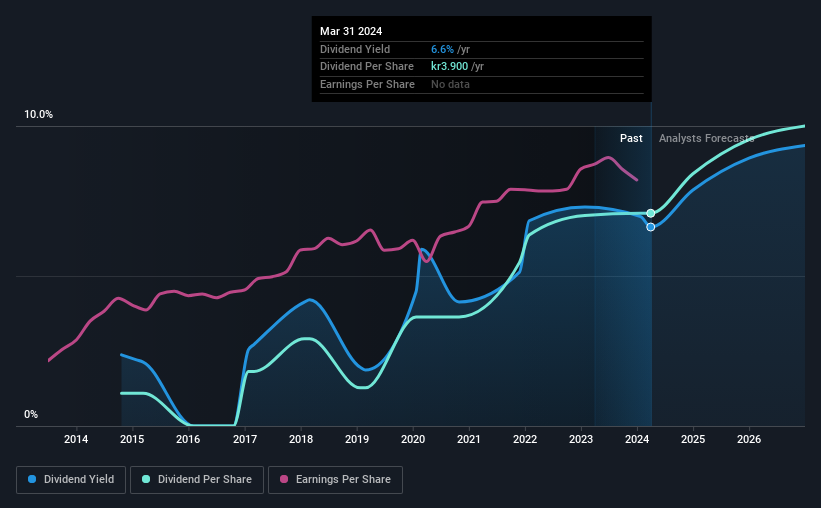Should Income Investors Look At Pareto Bank ASA (OB:PARB) Before Its Ex-Dividend?

Some investors rely on dividends for growing their wealth, and if you're one of those dividend sleuths, you might be intrigued to know that Pareto Bank ASA (OB:PARB) is about to go ex-dividend in just three days. Typically, the ex-dividend date is one business day before the record date which is the date on which a company determines the shareholders eligible to receive a dividend. The ex-dividend date is of consequence because whenever a stock is bought or sold, the trade takes at least two business day to settle. Therefore, if you purchase Pareto Bank's shares on or after the 5th of April, you won't be eligible to receive the dividend, when it is paid on the 15th of April.
The company's next dividend payment will be kr03.90 per share, on the back of last year when the company paid a total of kr3.90 to shareholders. Looking at the last 12 months of distributions, Pareto Bank has a trailing yield of approximately 6.6% on its current stock price of kr058.80. We love seeing companies pay a dividend, but it's also important to be sure that laying the golden eggs isn't going to kill our golden goose! So we need to investigate whether Pareto Bank can afford its dividend, and if the dividend could grow.
View our latest analysis for Pareto Bank
Dividends are typically paid out of company income, so if a company pays out more than it earned, its dividend is usually at a higher risk of being cut. Pareto Bank paid out more than half (53%) of its earnings last year, which is a regular payout ratio for most companies.
Companies that pay out less in dividends than they earn in profits generally have more sustainable dividends. The lower the payout ratio, the more wiggle room the business has before it could be forced to cut the dividend.
Click here to see the company's payout ratio, plus analyst estimates of its future dividends.

Have Earnings And Dividends Been Growing?
Businesses with strong growth prospects usually make the best dividend payers, because it's easier to grow dividends when earnings per share are improving. If earnings decline and the company is forced to cut its dividend, investors could watch the value of their investment go up in smoke. With that in mind, we're encouraged by the steady growth at Pareto Bank, with earnings per share up 7.3% on average over the last five years.
We'd also point out that Pareto Bank issued a meaningful number of new shares in the past year. Trying to grow the dividend while issuing large amounts of new shares reminds us of the ancient Greek tale of Sisyphus - perpetually pushing a boulder uphill.
Many investors will assess a company's dividend performance by evaluating how much the dividend payments have changed over time. Pareto Bank has delivered an average of 23% per year annual increase in its dividend, based on the past nine years of dividend payments. We're glad to see dividends rising alongside earnings over a number of years, which may be a sign the company intends to share the growth with shareholders.
Final Takeaway
Should investors buy Pareto Bank for the upcoming dividend? Pareto Bank has been generating some growth in earnings per share while paying out more than half of its earnings to shareholders in the form of dividends. In sum this is a middling combination, and we find it hard to get excited about the company from a dividend perspective.
With that being said, if dividends aren't your biggest concern with Pareto Bank, you should know about the other risks facing this business. Every company has risks, and we've spotted 2 warning signs for Pareto Bank you should know about.
If you're in the market for strong dividend payers, we recommend checking our selection of top dividend stocks.
New: Manage All Your Stock Portfolios in One Place
We've created the ultimate portfolio companion for stock investors, and it's free.
• Connect an unlimited number of Portfolios and see your total in one currency
• Be alerted to new Warning Signs or Risks via email or mobile
• Track the Fair Value of your stocks
Have feedback on this article? Concerned about the content? Get in touch with us directly. Alternatively, email editorial-team (at) simplywallst.com.
This article by Simply Wall St is general in nature. We provide commentary based on historical data and analyst forecasts only using an unbiased methodology and our articles are not intended to be financial advice. It does not constitute a recommendation to buy or sell any stock, and does not take account of your objectives, or your financial situation. We aim to bring you long-term focused analysis driven by fundamental data. Note that our analysis may not factor in the latest price-sensitive company announcements or qualitative material. Simply Wall St has no position in any stocks mentioned.
About OB:PARB
Undervalued with proven track record and pays a dividend.


